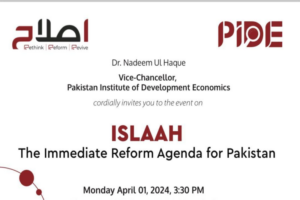This webinar seeks to breakdown the concept of youth idleness into its causes/determinants and its consequences based on the emerging personality traits, consequences of such behaviour, changing trends and way forward to get better insights for the policy-making. Attitudes of the persons towards work differ between societies, which depends on the several factors that are responsible for the formation of personality traits of the persons. The absence of positive and productive attitude lead to the idleness, which keeps an individual in a state of inaction. It is observed that the idleness and lack of will to work among youth is increasing day by day in Pakistan. According to ILO, the Not in Employment, Education or Training rates in the country were declining before the 2009 crisis and are rising ever since. Additional to the issue of idle youth is that of “empty labour”, which means to indulge in all activities at work, other than work resulting in falling labour productivity and stagnant total factor productivity in Pakistan. Due to poor attitude at work, individuals cannot either take stress or have such personality traits, which are inimical to the work culture of an organization. Hence, low rates of employment are thus not the only issue, but labour being unable to perform to their maximum capacity is too. Nature of procrastinating and staying idle (voluntarily or otherwise), if ignored in this age group can come up with up with a trade-off that proves to be detrimental for Pakistan, which has 30% of the youth aged between 15 and 29 years.







